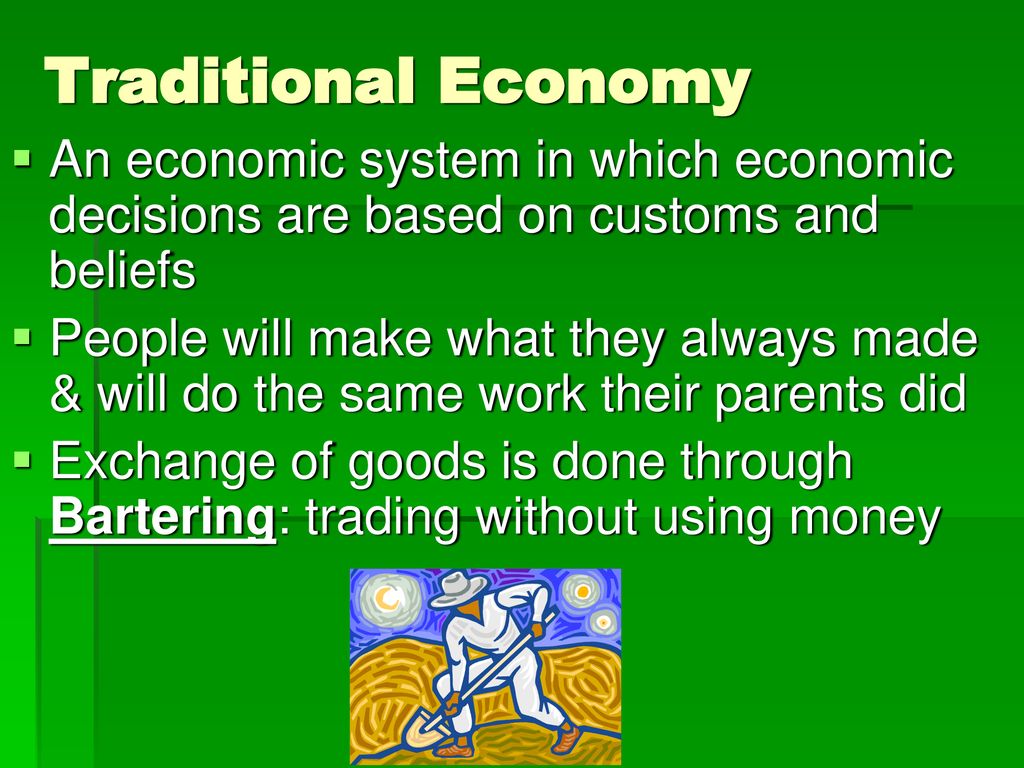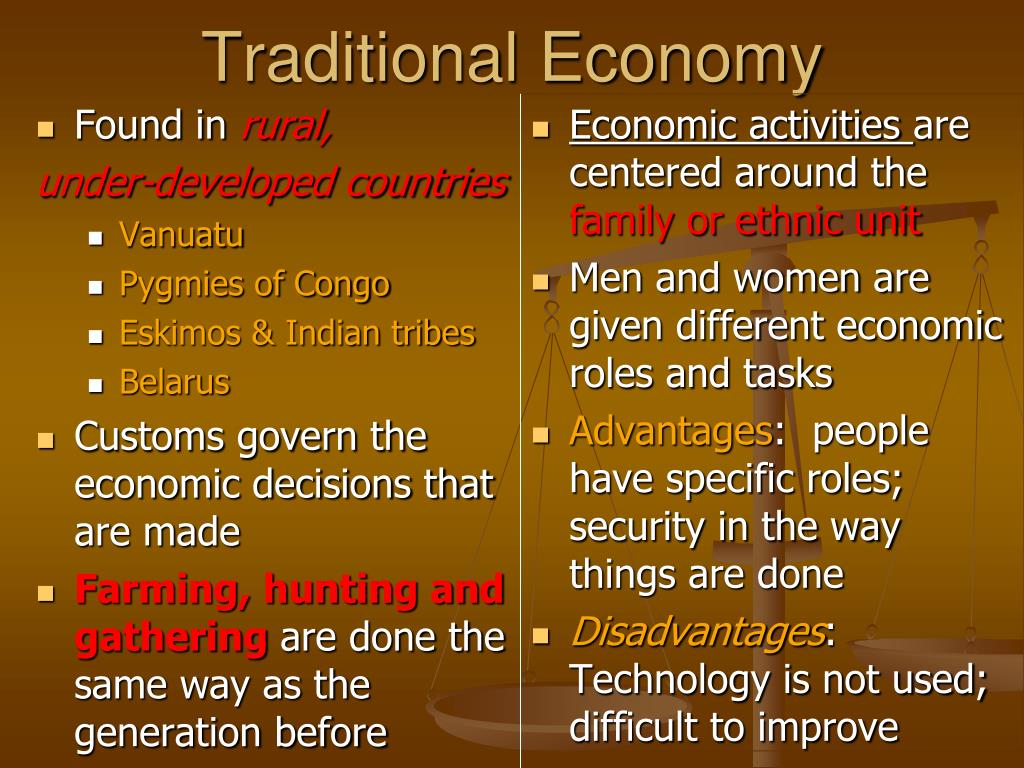Understanding Traditional Economies: Customs, Traditions, & More
Can economic systems truly be shaped by the echoes of the past, where tradition dictates the present and future? The enduring presence of traditional economies, though often overlooked, underscores the powerful influence of cultural values and customs in shaping how societies make fundamental economic choices.
A traditional economy, at its core, is a system deeply rooted in the past. Economic decisions aren't driven by the pursuit of profit or the whims of the market, but by the unwavering adherence to long-held traditions, customs, and beliefs. These practices, passed down through generations, dictate what is produced, how it is produced, and for whom it is produced. This is a world where the rhythms of life are dictated by the seasons, the land, and the inherited wisdom of ancestors.
Consider a family within a traditional economy. The adults might cultivate the land, teenagers assist in the fields or learn crafts, and young children begin to absorb the skills and knowledge necessary to continue the family's way of life. This microcosm reflects the broader economic structure, where continuity and adherence to tradition are paramount. There is little room for the dynamism of entrepreneurship or the disruptive forces of innovation. Instead, the focus remains firmly fixed on maintaining the established order.
The fundamental economic questions what to produce, how to produce, and for whom to produce are answered not by market forces or central planning, but by the accumulated wisdom of the community. Family elders, community leaders, or tribal authorities typically make these critical decisions, guided by the needs and customs of the group. Bartering and trading often replace the use of money, with goods and services exchanged based on established norms. Agriculture, hunting, and fishing often form the bedrock of economic activity, reflecting a close connection to the land and the natural world. This can be a system where an individual's role is determined by their place in society, often tied to their family's status and occupation.
The United States, like other modern economies, is a complex system. This is a blend of economic principles, incorporating elements of market, command, and traditional systems. This mixed approach reflects the evolving nature of economic thought and the need to adapt to changing global circumstances.
In a traditional economy, choices are not made with an aim to create wealth. The emphasis is instead put on honoring the cultural norms and values.
Here is an overview of the types of economies:
| Economic System | Key Characteristics | Decision-Making Process | Dominant Features |
|---|---|---|---|
| Traditional Economy | Based on customs, traditions, and beliefs passed down through generations. | Decisions made by community, family elders, or tribal leaders. Production and distribution guided by customs and community needs. | Farming, hunting, fishing, bartering, and trading. Limited economic growth and change. |
| Command Economy | Characterized by a dominant centralized power (government). | The government makes all or most production decisions. | Centralized control, often with limited individual freedom or consumer choice. |
| Market Economy | Relies on supply and demand dynamics and individual choices. | Consumers and producers drive choices, prices guide the allocation of resources. | Competition, consumer choice, and innovation. Potential for income inequality. |
| Mixed Economy | Combines characteristics of traditional, command, and market economies. | A blend of various decision-making processes. | Can vary widely, depending on the specific blend of systems. |
In contrast, a market economy thrives on supply and demand, guiding the allocation of resources through prices, while a command economy operates under centralized government control. These dynamics stand in stark contrast to the traditions and customs that define a traditional economy.
In country B, for instance, the economic landscape is one where business owners make decisions on production, output, and distribution. These actions are influenced by supply and demand dynamics, where prices reflect the balance between consumer wants and business owner production.
Consider the decisions of the CEO of Tarheelia Audio. They are directly influenced by the market demands, production changes and consumer choices of the MP3 player over their CD players.
It's important to recognize that traditional economic theory is shaped by three essential assumptions. One of the assumptions is, People will change their thoughts and beliefs based on new information. The second is that According to traditional economics, in an ideal world, people would always make the best decisions. The third is that people should be guided by their beliefs and actions.
Often overlooked is the environmental friendliness inherent in traditional economies. The reliance on sustainable practices and a deep connection to the land often results in less environmental destruction than modern industrial societies.
Let's delve into the advantages and disadvantages of this economic approach, highlighting the role of tradition, the limitations, and the potential for adaptation.
Another often overlooked advantage to the traditional economy is that it is less environmentally destructive than industrial societies.
Disadvantages of a traditional economy:
Families often follow the same occupations as their ancestors, leading to a system that emphasizes continuity and adherence to tradition.
For example, consider the instance of Paul, who became a farmer because every man in his family had been farming for hundreds of years. This is a clear example of how tradition dictates individual choices and career paths.
In economics, four types of economic systems characterize most economies around the world: Traditional, command, market, and mixed economies.A traditional economic system focuses exclusively on goods and services that are directly related to its beliefs and traditions.A command economic system is characterized by a dominant centralized power.
In traditional economies, fundamental economic decisions, such as the production and distribution of goods and services, are determined by tradition and societal needs rather than by their potential for monetary profit.
Several traditional economies have evolved into a mixed type that incorporates elements from capitalism, socialism, or communism.
In a traditional economy, economic decisions are made by tradition and custom, rather than by markets or government.
Economic decisions in traditional economies:
Instead, they are fundamentally rooted in custom, tradition, and the wisdom passed down through generations. Decisions concerning production, distribution, and consumption are guided by time
How are economic decision made in a traditional economy? Traditional economies base economic decisions on cultural values and beliefs. This economy relies on farming, hunting, and fishing.
Traditional economies can be negatively affected by other economy types. Traditional economies are shaped by customs, traditions, and beliefs, and rely on agriculture, hunting, and gathering.
As societies evolve, traditional economies may evolve into mixed economies, absorbing elements from capitalism, socialism, or communism. This adaptation is a testament to the need for change and the potential for these economic systems to adapt to the evolving social needs.
- 50 Cent Diddy Daphne Joys Allegations Reactions Latest News
- Eminem Rachel Chandler Unraveling Their Complex Relationship

PPT Comparing types of Economic Systems PowerPoint Presentation ID

Economic Systems. ppt download

PPT Economic Systems PowerPoint Presentation, free download ID 1566224